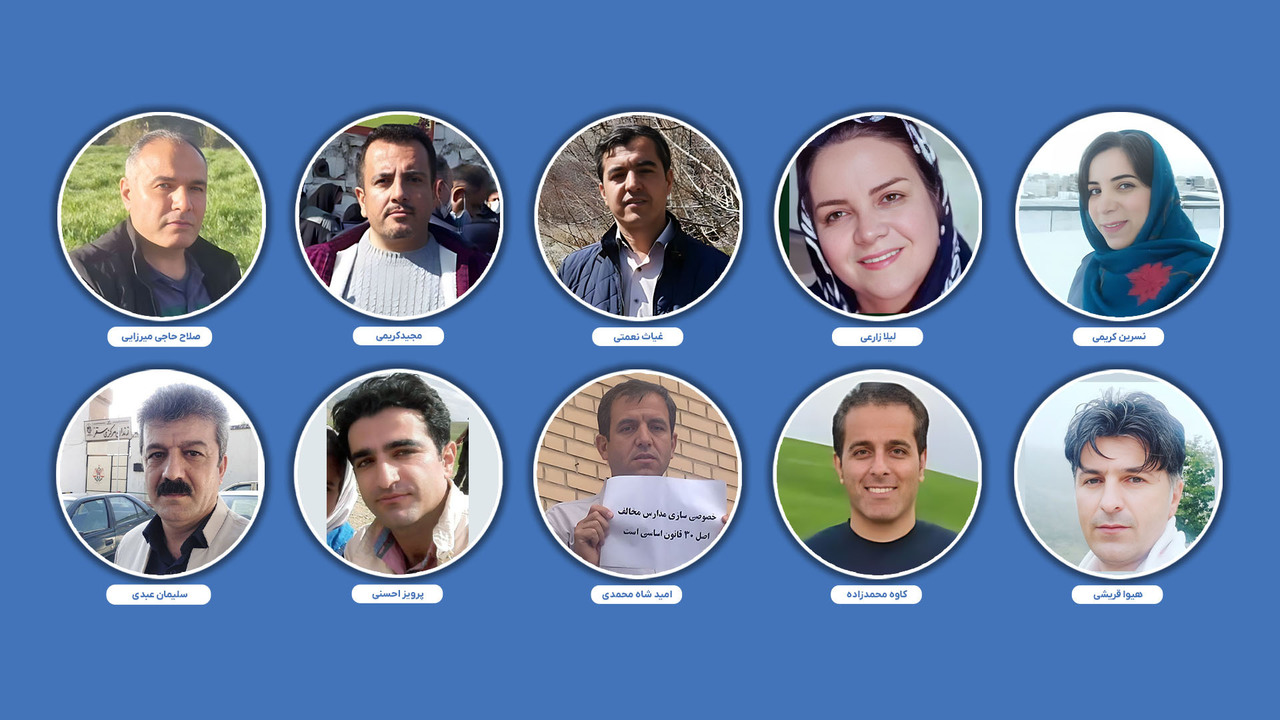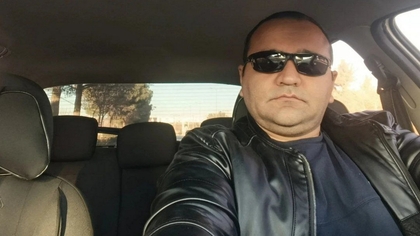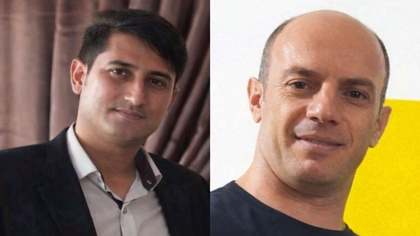Repression of Teachers' Union Activists in Kurdistan: From Dismissals and Suspensions to Forced Retirement and Administrative Sanctions Against 15 Kurdish Teachers in Sanandaj, Divandarreh, and Saqqez

The Kurdistan Education Department’s Administrative Violations Board, followed by the Ministry of Education’s Appeals Committee, through an unfair and non-independent process, have issued and subsequently upheld or intensified severe disciplinary rulings against at least 15 Kurdish teachers. These rulings include dismissals, permanent suspensions, forced retirements with demotions, exile, and bans on holding sensitive positions.
The direct trigger for this wave of repression was the periodic election of the Kurdistan–Sanandaj Teachers’ Union in May 2025—an election that, unlike most of Iran, was held in Kurdistan with the participation of hundreds of teachers, reflecting the province's pivotal role in preserving the tradition of union organizing. From that moment, administrative and security apparatuses began a campaign of retaliation, opening cases against organizers and candidates.
Despite documented defenses and negotiations between the teachers’ community and provincial officials, the administrative violation boards ignored these arguments and instead fully upheld or intensified the original rulings in appeals. This clearly reflects a systematic use of “administrative” mechanisms to eliminate and criminalize union activism—a strategy that punishes teachers instead of responding to their legitimate demands and removes them from educational and social spheres.
A Breakdown of the Sentences Issued Against 15 Convicted Kurdish Teachers:
The disciplinary rulings against these 15 Kurdish teachers include:
Dismissal and permanent separation from public service (6 individuals)
Temporary suspension (3 individuals)
Forced retirement with demotion in rank (3 individuals)
Administrative exile to another province (1 individual)
Ban on appointment to sensitive positions (1 individual)
Key Features of the Crackdown:
The majority of those punished were either union leaders or election candidates.
Most had long-standing careers in education (ranging from 17 to 30 years).
Many sentences were intensified at the appeals stage.
Officials have shown contradictory and indifferent responses:
The Director General of Education claimed “no teachers have been dismissed.”
The Governor openly refused to meet with the teachers.
This case is a clear example of the bureaucratization of union repression—where administrative violation boards are used to eliminate union activists and silence independent teacher organizations. The severity and nature of the penalties—ranging from dismissal and exile to forced retirement—suggest that the aim is not administrative reform, but rather political retaliation and the intimidation of the broader teaching community in Kurdistan.
List of the 15 Sentenced Kurdish Teachers by City, Including Sanctions and Employment History:
Sanandaj:
Majid Karimi – Master’s in Political Science, 23 years of service – Dismissed and permanently removed from all public service positions.
Ghiyas Na’mati – Master’s in Clinical Psychology, 17 years – Permanently dismissed from the Ministry of Education.
Salah Hajimirzaei – Master’s in History, 26 years – One-year temporary suspension.
Nasrin Karimi – Master’s in Sociology, 2 years – Forced retirement with a two-grade demotion.
Leila Zarei – Bachelor’s in Elementary Education, 30 years – Removed from assistant principal role; forced retirement with one-grade demotion (she had only been a candidate for the union board).
Faysal Nouri – Master’s in Mathematics, 19 years – Forcibly transferred/exiled to Kermanshah Province for 5 years.
Mohyeddin Reyhani – 26 years – Banned from appointment to sensitive government positions for 5 years.
– Name withheld due to a family member's health condition – Initially sentenced to one-year suspension; sentence was intensified at appeal to permanent dismissal.
Divandarreh:
Parviz Ahsani – Member of the Divandarreh Teachers' Union – Dismissed for union activity.
Kaveh Mohammadzadeh – Member – Dismissed.
Hiwa Qureshi – Member – Dismissed.
Omid Shahmohammadi – Member – Dismissed.
Saqqez:
Shahram Karimi – Six-month suspension from public service.
Loqmanollah Moradi – One-year suspension.
Suleiman Abdi – Forced retirement with a two-grade demotion.
From the Silence of Seyed Fouad Hosseini and Arash Zare'tan Lahouni to the Denial of Dismissals and Deflection to the Administrative Court — A Union Member's Testimony
Following the confirmation of harsh sentences against these 15 Kurdish teachers, the Kurdistan Teachers’ Union issued a statement condemning the rulings and highlighting that they were confirmed despite public denials from Seyed Fouad Hosseini, Director General of Kurdistan’s Department of Education, who recently claimed in an interview that “no teacher has been dismissed.”
Meanwhile, in recent days, an official letter was sent to Arash Zare'tan Lahouni, the Governor of Kurdistan Province, by several teachers requesting a dialogue regarding their situation. However, the governor explicitly stated that he “will not meet with any teachers” and that the case must be pursued through the Administrative Court of Justice.
According to a member of the Kurdistan Teachers’ Union, who spoke to Kurdpa, the recent reactions from provincial officials represent not only blatant indifference toward the teachers who have been penalized, but also a structurally organized campaign against the union in Kurdistan.
The union member emphasized that the Kurdistan Teachers’ Union, established in 2003, is one of the oldest and most active professional associations in Iran. Despite repeated security pressures and even forced shutdowns, it has consistently played a pioneering role in organizing union activities and defending teachers’ rights.
They added that in the past two decades, Kurdistan has been the only province in Iran to continuously hold free union elections—from the 2003 election with 1,200 participating teachers to the 2025 online election with 350 participants.
Referring to the positions taken by the governor and the director of education, the union member stated:
“When Seyed Fouad Hosseini insists no teacher has been dismissed—despite the issuance of dozens of dismissal and suspension orders—and when Arash Zare'tan Lahouni, the Governor of Kurdistan, publicly declares he refuses to meet with teachers, it clearly reveals a pattern of evasion at the highest provincial level.
These two officials cannot simply pass all responsibility to the Administrative Court while ignoring their own role. These rulings were first issued at the provincial level and later upheld by the Ministry of Education. Therefore, direct responsibility lies with provincial authorities and the Pezeshkian administration.”
In closing, the union member stressed that the current policy amounts to “administrative revenge” against Kurdish educators—not carried out through the judiciary, but through the administrative disciplinary system and agencies within the executive branch.
According to them, the Pezeshkian government, which claims to represent “social cohesion” and “public participation,” must be held accountable for this process, since the Kurdish teachers have acted entirely within the legal framework, specifically Articles 26 and 27 of the Constitution, and have committed no illegal actions.
From Denial to Escalation: Despite Previous Claims, Final Rulings Intensified for 15 Kurdish Teachers
Just four months ago, the former Director of Education for Kurdistan Province claimed that “no teacher had been dismissed” and assured that all harsh rulings would be “resolved favorably in appeal.” However, in August 2025, the very same appeals committee issued final and severe disciplinary rulings against 15 Kurdish teachers—including six dismissals and eight intensified penalties.
On April 16, 2025, during a farewell ceremony marking the end of his tenure and the appointment of Seyed Fouad Hosseini as the new Director of Education, Hashem Nazemi-Jalal stated:
“During the unrest of 2022, sworn enemies of the Islamic Republic tried to cause problems for the Ministry of Education and our noble teachers’ community.
Some media outlets spread conflicting numbers, claiming 600 or 700 disciplinary cases were issued. In reality, the number didn’t even reach 60, and not a single person was dismissed.
Of those 60, around 10 to 12 received tough rulings, but with my intervention, the positive stance of national officials, and the cooperation of the teachers, these issues will be resolved in the best way possible during appeals.”
Yet, just four months later, the Ministry of Education’s Appeals Committee ruled in direct contradiction to Nazemi-Jalal’s promises, issuing final, harsh disciplinary actions against 15 teachers:
6 permanent dismissals from public service
3 temporary suspensions
3 forced retirements with demotion
1 administrative exile to another province (5 years)
1 ban on appointment to sensitive positions
This outcome directly undermines the earlier public reassurances and reveals a stark gap between official rhetoric and actual administrative action.
The Escalating Repression of Teachers and Systematic Case-Building in Kurdistan
In addition to the finalized disciplinary rulings in August 2025 against 15 Kurdish teachers, it is necessary to recognize the broader, long-term campaign of suppression and militarization within the education system of Kurdistan Province.
On January 26, 2025, a group of teachers facing disciplinary actions, bans, or convictions in Kurdistan published an open letter addressed to officials and the general public. The letter presented a comprehensive overview of the repressive climate in Kurdistan’s schools and education offices over the past two years, during which dozens and even hundreds of teachers have been targeted by security and administrative crackdowns.
According to the letter, between early 2022 and winter 2025, the following developments occurred:
Teachers’ union gatherings were criminalized, and many educators were arrested and beaten.
Over 700 teachers faced salary deductions for protesting the presence of military forces in schools.
47 teachers were stripped of their eligibility for professional ranking.
The Kurdistan Teachers’ Union, a legal and deeply rooted organization, was administratively and unlawfully declared “dissolved.”
In 2023 and 2024, schools and education offices were militarized, and over 1,000 teachers had cases opened against them; hundreds faced dismissal, suspension, exile, or forced retirement.
This pattern of widespread and institutionalized repression reflects not isolated incidents but a coordinated policy to silence dissent and dismantle union structures within the education sector of Kurdistan.
A Look at Mass and Systematic Repression: From Ranking Disqualifications to Collective Disciplinary Orders Against Kurdistan’s Teachers—via Administrative, Security-Judicial, Economic, and Surveillance Tools (2022–2024)
A review of documented evidence shows that the targeting of teachers in Kurdistan has not been isolated, but instead executed in a coordinated and systematic manner by multiple state institutions. The Kurdistan Provincial Department of Education, Administrative Disciplinary Boards, the Supreme National Security Council, and security agencies have all played direct roles in this crackdown.
These actions have largely been collective and mass-scale, involving:
Group removals from the professional ranking system,
Administrative reprimands for hundreds of teachers,
Financial penalties for dozens of union activists,
And disciplinary rulings against scores of teachers at once.
This pattern makes clear that the prevailing state policy is not to address educational or professional grievances, but to eliminate dissenting voices, suppress union demands, and tighten control over the educational environment. Beyond collective actions, dozens of individual cases of arrest, imprisonment, social exclusion, and forced exile have also been documented—revealing the broader scope of repression.
Key Cases and Chronology:
April 20, 2023 – Mass Ranking Disqualifications:
The Kurdistan Department of Education, under orders from the Supreme National Security Council and through its Emergency Committee, removed dozens of teachers in Sanandaj, Marivan, and Saqqez from the national teacher ranking system.
Accusations included:
“Membership in illegal unions”
“Spreading false information”
“Actions against national security”
“Inciting unrest”
Notable affected individuals included Majid Karimi, Ghiyath Na’mati, Kaveh Mohammadzadeh, Hiwa Qureshi, Parviz Ahsani, Faisal Nouri, Soleiman Abdi, and Jahangir Bahmani—many of whom also faced simultaneous legal and security cases. (36 names were cited in the report.)
December 24, 2022 – Mass Reprimand of Striking Teachers:
The Coordinating Council of Teachers’ Trade Unions of Iran reported that over 200 teachers in Sanandaj, Marivan, and Saqqez received formal reprimands after participating in professional strikes and sit-ins. This administrative retaliation formed part of an organized campaign to punish protesting teachers instead of addressing their demands.
January 22, 2023 – Financial Penalties for 43 Union Activists:
According to the same council, 43 union activists in Saqqez, Divandareh, Sanandaj, and Marivan were fined by order of the Supreme National Security Council.
Details:
Approx. 6 million tomans deducted from each teacher’s salary over two months,
Teachers were informed that the deductions would continue until June,
Further deductions threatened unless they signed pledges not to participate in protests.
Prominent fined individuals included: Soleiman Abdi, Taher Ghaderzadeh, Salah Sarkhi, Loqmanollah Moradi, Tahsin Mostafa, Sheyda Shams, Parviz Ahsani, Kaveh Mohammadzadeh, Hiwa Qureshi, Mokhtar Asadi, Majid Karimi, Jahangir Bahmani, and Faisal Nouri.
This demonstrates how economic tools were also weaponized alongside legal and disciplinary mechanisms to exert pressure.
February 3, 2025 – Disciplinary Sentences for 47 Teachers:
Documents released by Kurdpa showed that the Kurdistan Department of Education issued disciplinary sentences against 47 union activists in Sanandaj, Saqqez, Marivan, Divandareh, Ziwiyeh, and Dehgolan.
Details:
27 cases of ranking disqualification,
10 dismissals,
6 suspensions from public service,
4 forced retirements,
4 written warnings,
4 salary cuts,
2 forced transfers (exile),
1 ban from senior positions,
1 additional ranking disqualification.
The group included 13 women and 34 men. These rulings came in the wake of the “Jin, Jiyan, Azadi” uprising. Sources noted that a complaint was sent to the Minister of Education regarding these decisions.
June 1, 2025 – Judicial Cases and Summons for 15 Teachers in Sanandaj:
Continuing the crackdown, 15 teacher union activists in Sanandaj were summoned to Branch 109 of the Sanandaj Criminal Court II on charges of “disturbing public order and peace.”
The summons, issued on June 1, required the teachers to appear by June 9 for final defense. The case was based on an indictment from the Sanandaj Public and Revolutionary Prosecutor’s Office, citing their participation in June 2022 protest gatherings.
Among those summoned:
Majid Karimi, Nasrin Karimi, Seyed Ghiyath Na’mati, Faisal Nouri, Mokhtar Asadi, Salah Haji Mirzaei, Behzad Ghavami, and Reza Tahmasbi.
This shows that judicial repression is being deployed alongside administrative tools—including dismissals, suspensions, and forced retirements—to silence unionized teachers in Sanandaj.
The Constitution Guarantees the Right to Union Activity — Yet the Disciplinary and Security Rulings Against Kurdistan’s Teachers Violate Even the Laws of the Islamic Republic
Legal Framework for Teachers' Unions in Iran:
Article 26 of the Constitution:
Formation of parties, associations, and political or professional unions is permitted, provided they do not violate principles of independence, freedom, and national unity, and refrain from the use of weapons.
Article 27 of the Constitution:
Peaceful assemblies and demonstrations are allowed, without carrying weapons and provided they are not contrary to Islamic principles.
Article 131 of the Labor Law:
Grants workers and employees—including teachers—the right to establish unions to pursue their legal and professional interests.
Law on Islamic Labor Councils & Bylaws of Professional Unions:
Sanctions the right of unions to hold meetings, organize internal elections, issue statements, advocate for members’ rights, and negotiate with state institutions within the legal framework.
Based on these laws, the Kurdistan Teachers' Union operates legally and professionally, even by the standards of the Islamic Republic. Its activities—such as internal elections, issuing statements, participating in union gatherings, and defending teachers’ workplace rights—fall fully within this legal framework.
Violations of Law in Rulings Against Teachers in Kurdistan:
Despite the above clear legal protections, the rulings against Kurdistan’s teachers—which include dismissals, forced retirements, salary cuts, loss of professional ranking, forced transfers, and bans from employment—directly violate these very laws:
Violation of Article 26:
Treating union membership and participation in teachers’ associations as “illegal activity” is a direct violation, since these unions were founded under Article 26 itself.
Violation of Article 27:
Reprimanding, fining, and prosecuting teachers for attending professional protests or sit-ins undermines their constitutional right to peaceful assembly.
Violation of Article 131 of the Labor Law:
Any punishment or restriction imposed for union activity or the pursuit of labor rights contradicts Article 131, which explicitly guarantees such activity.
Security Framing Instead of Labor Context:
Referring union-related cases to Disciplinary Boards or even Revolutionary Courts under charges such as “actions against national security” or “inciting public opinion” reveals the intentional securitization of union activity and complete circumvention of the Islamic Republic’s own laws.
Violation of the Principle of Proportionality:
Harsh rulings like dismissal, suspension, and forced retirement are disproportionate and arbitrary, even under internal disciplinary regulations. They violate the principle of fairness in administrative law.
Conclusion:
The state’s actions against Kurdistan’s teachers not only violate international standards of labor rights and union freedoms, but even lack legal legitimacy under the formal laws of the Islamic Republic itself. They are contradictory, unlawful, and devoid of any valid legal basis.
Compiled by: Awin Mostafazadeh



